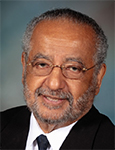The Volunteer who became the founding Director of the National Afro-American Museum and Culture Center — Dr. John Fleming (Malawi)
A Profile in Citizenship
— Jeremiah Norris (Colombia 1963-65)
Dr. John Fleming graduated from Berea College, Berea, Kentucky, in 1966 and attended the University of Kentucky, then served as a Peace Corps Volunteer in Malawi from 1967 to 1969. While a volunteer, he attended the University of Malawi. Returning home, he attended Howard University graduating with a Ph. D. in American history in 1974.

Dr. John Fleming
Prior to Peace Corps service, Dr. Fleming had wanted to become a missionary and thought that his Peace Corps experience would prepare him for work in Africa. Dr. Fleming was greatly disappointed to learn how missionaries of various religious persuasion treated Africans — and of how he as an African American, received the same treatment from them. Such treatment changed his mind about being a missionary. He recalled one incident when he was traveling to a friend’s village. He arrived late one evening when it was too late to travel the last mile in the dark. He asked the fathers at the local mission if he might spend the night. They denied his request to even sleep on their porch. In a later incident, he and other volunteers were denied accommodations by American missionaries, but were told they could sleep in the garage. The next morning, he asked if he might wash up in their bathroom and was told to use an outside hose for that purpose.
After earning his Ph. D., he spent six years working as a Senior Fellow at Howard University’s Institute for the Study of Educational Policy (ISEP). During this time, he wrote two books: The Lengthening Shadow of Slavery:A Historical Justification for Affirmative Action for Blacks in Higher Education, and The Case for Affirmation Action for Blacks in Higher Education.
A casual discussion ignited a lifetime passion for museum management
Dr. Fleming was asked by an ISEP (International Student Exchange Programs) board member who was serving as president of a college in Ohio if he would be interested in starting a museum. Dr. Fleming commented: “I didn’t know much about museums, but it seemed interesting.” After an interview with the Ohio Historical Society in 1980, he was named Director of the National Afro-American Museum and Culture Center in Wilberforce, Ohio. He enjoyed the work, found it challenging, and stayed in the field for 41 years.
The museum opened in 1988. Dr. Fleming served as its director for a decade, then went on to direct the National Underground Railroad Freedom Center in Cincinnati. He served as Director of Planning and Development of the International African American Museum in Charleston, South Carolina, and as a Senior Consultant for the Mississippi Civil Rights Museum in Jackson, Mississippi.
While working with the Cincinnati Museum Center, and before joining the International African American Museum in Charleston, S.C., Dr. Fleming became the executive producer of a 12,000 square foot museum exhibition called “America, I Am: The African American Imprint,” which went on a nationwide tour. (The idea for the exhibition originated with Tavis Smiley who is a well-known talk show host and author.)
Dr. Fleming was appointed by then-president George W. Bush to serve on the Commission for the National Museum of African American History and Culture, a museum of the Smithsonian Institution in Washington, D.C.. It held hearings around the country, employed a staff person to research the history of the efforts to establish the museum going back to the early 20th century, and wrote a report to the President and Congress with a recommendation to establish the national museum. And, as Dr. Fleming wrote: “We also recommended sites on the National Mall for the location of the museum”.
In January 2014, he became Director of the National Museum of African American Music in Nashville, Tennessee. He wrote of this appointment: “Music is so central to our culture. I saw it as an opportunity to explore history and the music that emerged from our historical experience”.
In addition to directing museums, Dr. Fleming is currently writing a memoir about his Peace Corps experience and plans to write a book about his museum work. He has recently consulted with the Netherland’s Government on a new National Museum of Slavery. For his work on museums, Dr. Fleming was awarded the Franklin H. Williams Award for Outstanding Community Service.
Dr. Fleming would like to see more museums devoted to African American history and culture, and in addition that mainstream museums and school text books be more inclusive in incorporating African American history. He commented: “I think the biggest misconception about African American history is that it is separate from American history, when in fact, they are one and the same.”. He went on to say that “we noted in the National Museum of African American Music that black music is American music and that people should remember that black history is American history.”
Dr. Fleming catapulted black history, music and culture to vivid life through a contemporary environment in which our past still matters “where we need to see ourselves as one people, one nation in which we cannot succeed as a nation unless we all succeed.” In this time of his life, Dr. Fleming continues to pay homage to the principles Yeats called the “monuments of unageing intellect,” earning him a highly deserved Profile in Citizenship.
What a wonderful summary of Dr. John Flemming’s wonderful work. Thank you.
John,
You have shown that a small town kid from Western North Carolina (Morganton) can achieve great heights and make remarkable contributions on both the national and international stages.
Let me know if you have tried out the Chichewa Dictionary. If so, feel free to contribute your suggestions.
Chichewa > Chingerezi < Chichewa
http://translate.chichewadictionary.org